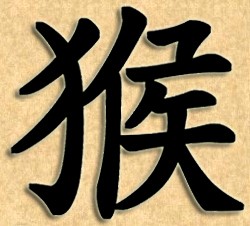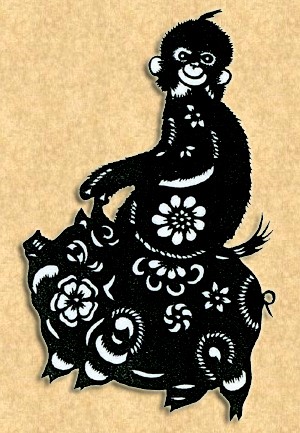
China Bridge (神州橋樑)_2004/Jan
The Year of the Monkey
Every New Year is a time for new beginnings, a time for joy and a time to hope that the future will bring blessings. The Chinese Lunar New Year marks the beginning of spring and it is often called the Spring Festival.
This year, perhaps more than many other recent years, most people in Hong Kong and throughout the world are happy to say goodbye to the Year of the Ram (Goat, Sheep) and to welcome the Year of the Monkey. The Year of the Ram did not live up to expectations. It was supposed to bring us peace and harmony. It was supposed to bring us prosperity and serenity. It was supposed to be a good year for doves!
Some years are not the best of years and the 2003 Year of the Ram was certainly not one of best for Hong Kong. We lived through an unprecedented economic downturn and rampant unemployment. People were dissatisfied with the government. Then came the SARS epidemic. Hong Kong came to a virtual standstill.
Then, on July 1, frustration with the government erupted into the streets as 500,000 people marched in protest against the proposed subversion law.
The rest of the world did not fare much better. Conflicts in the Middle East continued unabated and terrorism did not lessen. Neither was Mother Nature very kind. She rocked the earth with terrible earthquakes and seemed to delight in floods and landslides all of which caused dreadful injuries and claimed a large number of lives.
If 2003 was not a banner year for Hong Kong or for society in general, neither was it a good year for the Church in China. As the Year of the Ram gives way to the Year of the Monkey, there are still two bishops, and at least a dozen young priests in detention.
Detentions continued almost unabated throughout the year. There was a general crackdown on all groups not registered with the government and a tightening of the Catholic Church in particular, with special documents threatening to change the very structure of the Church in China from that of the Universal Church. Can we expect the Year of the Monkey to be kinder, and gentler?
The Monkey in the lunar calendar
The Year of the Monkey in 2004 of the Gregorian calendar is Year 4701 in the Chinese calendar. The Chinese calendar is based on the year the Yellow King came into power: 2697 BC.
The Year of the Monkey 2004 is the Year of the Green Monkey. The monkey was the ninth animal to arrive at the feet of the Lord Buddha to say goodbye before he left the earth. Since only 12 animals in all – according to legend – responded to the Lord Buddha’s invitation to come for a final farewell, the monkey had obviously taken his time.
Many Chinese, even today, believe that the animal that rules the year has a tremendous influence on the personality of those born in that year, and on that year’s events.
Monkey characteristics in Chinese folklore

The characteristics of the monkey, as depicted in Chinese folklore, can be found in some expressions common both in English and Chinese. Here are some examples: “What have you done, you young monkey?” “Stop your monkeying!” “She gets her monkey up if you tell her she’s wrong.” “Get the monkey off my back!” “I’ll be a monkey’s uncle!”
For the most part, these characteristics depict the darker side of the monkey. The monkey can be a trickster, unfriendly, noisy, messy and even annoying at times. Monkey people are sometimes said to be distrustful and opportunists. They are often competitive, jealous and interested in power, success and money.
But there is another side to their personality. Life with monkeys is never dull. They bring a smile and a sparkle to every situation. There is something spontaneous, warm and natural about the monkey person. Monkey people are known for their fine memory, their practicality, their ability to innovate and to learn fast. They are extremely self-confident and have the distinct ability to outsmart others without losing their friendship. They are also wonderful mimics who easily make other people laugh. Besides, they have that wonderful quality of being able to laugh at their own mistakes.
Events in past Years of the Monkey
In searching for events that transpired in China and the Church in China in past Years of the Monkey, we found the following:
1908: Belgian priest Vincent Lebbe (1877-1940) insisted that Church policy in China should be “China to the Chinese, the Chinese to Christ.” He launched the lay apostolate movement in Tianjin.
1920: Twelve years later, Fr. Lebbe was still active in favour of the Chinese. He protested against the Church’s use of “unequal treaties” in Tianjin. For his efforts, he was sent back to France. This was also the year that the first female students were admitted to Beijing University.
1932: Japan bombed Shanghai.
1944: The world was at war, with much of the Western world under German control; Hong Kong and much of China was under Japanese domination; D-Day, June 6, began a reversal of fortunes as Allied troops landed in Normandy.
1956: Mao launched the “Hundred Flowers Campaign” in May. Thirty-six Catholic representatives met with government officials to prepare to set up a nationwide Catholic Patriotic Association (July 19-25). Many bishops and lay people were imprisoned.
1968: Richard Nixon was elected president of the United States. He would eventually succeed in opening China’s door to the outside world.
1980: Cardinals Etchegarray and Koenig visited China. Bishop Zong Huaide was elected President of the Chinese Catholic Patriotic Association at the Association’s Third National Conference. Bishop Dominic Tang Yimeng of Guangzhou was released after 22 years of imprisonment. Gong Pinmei, Bishop of Shanghai, remained in prison. The Gang of Four went on trial. Shanghai Cathedral at Xujiahui reopened. There were now 12 Catholic churches open in China and 33 bishops in active ministry.
1992: Deng Xiaoping called for radical economic market reforms. Bishop Joseph Fan Xueyan, (unofficial) of Baoding, Hebei Province, died under mysterious circumstances; 10,000 people attended the funeral. Sheshan Seminary celebrated its 10th anniversary; 70 men were ordained to the priesthood since the seminary’s opening on 11 October 1982. The National Catholic Seminary officially opened its new headquarters in Beijing and 60 seminarians entered first year theology. Eight bishops died during the course of the year.
2004: What is in store for China and the Church in China in 2004?
Monkey Stories
Stories about monkeys make for good reading and abound in Chinese literature. The most famous is perhaps The Journey to the West, The Monkey King, and How the Monkey Became a God. These monkey legends are all well known to children and adults in China.
Famous Monkey People
Many famous people were born in the Year of the versatile and sociable Monkey. Among them are great actors like Betty Davis and Elizabeth Taylor, writers such as Charles Dickens, John Milton, great artists like Leonardo da Vinci, and Paul Gauguin, and film director/producer, Federico Fellini. Both Julius Caesar and Mick Jagger were born in the Year of the Monkey.
Happy New Year

The 2004 Year of the Monkey promises to be fun and exciting. Some predict that the Monkey is clever enough to put an end to Hong Kong’s recession, to prevent the return of SARS and to resolve the entire world’s terrifying woes. If this should indeed come true, when the Year of the Monkey gives way to the Year of the Rooster, the world will surely sing with Wang Jen Yu,
Go back home in the woods far away.
It is from there that you once came. There under the moon you will find peace,
Way beyond the hills you love, the hills of Sichuan. (BAM)
Happy New Year of the Monkey from all at the Holy Spirit Study Centre!


 ENG
ENG